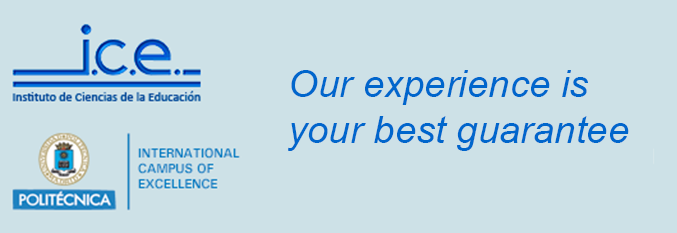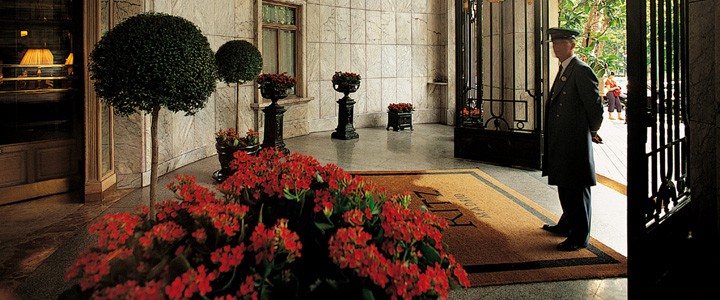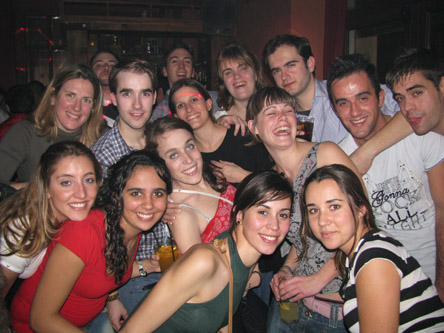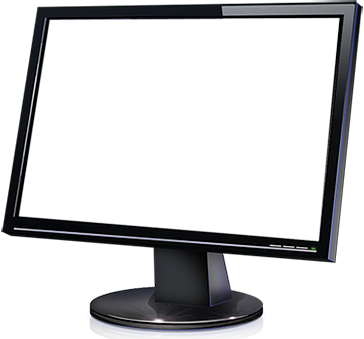

From enrollment dates
to the final
Master’s thesis

Advantages of early
enrollment

The Master’s program
includes internships
in benchmark companies

Our graduates
have a high level
of job placement
Download the program

Curriculum of the Master in Hotel Management
SCHEDULE: Mondays through Fridays 16:00-20:30
| MASTER | Class type | Time period | ETCS (European Credit Transfer System) |
|---|---|---|---|
| First term period | Face-to-face classes Complemetary activities |
October-June | 32 ETCS 4 ETCS |
Second term period | Internship in hotel business with a personal tutor and director | July- December | 21 ETCS | Third term period | Final Master thesis | Once the two previous ones are completed | 3 ETCS |

FIRST TERM - CONTENTS
This part of the master's degree corresponds to the development and delivery of content and knowledge theory and practice necessary to achieve a postgraduate specialization in Hotel management. Contents are grouped into eight thematic areas, each one comprising different disciplines. Some subjects and conferences might be taught in English.
1. Area: New trends in 21st century tourism
- Tourism and its influence in the knowledge society.
- Trends in world tourism.
- Sustainable tourism and land planning.
- Models of hotel activity.
- Hotel complementary entertainment offers: golf, spa, sea sports, etc.
2. Area: Organization and Hotel operations
- Hotel organization and its evolution. National and International hotel corporations.
- Rooms division management.
- Front desk operations: reception and concierge.
- Hotel management computer programs.
- Food and Beverage division: evolution, trends, and hotel operation management – diets.
- Risk analysis management and Hotel Critical Control Points.
- Customer service in the hotel organizations and hotel processes. Accessibility.
- Hotel opening & post-opening management.
3. Area: Economic feasibility in the Hotel business
- Impact of tourism on economy.
- Accounting.
- Production and cost management.
- Investment and hotel financing.
- Cost control and assessment of touristic projects.
4. Area: Strategic marketing and new ICTs.
- Strategic marketing and development in the Hotel industry in the 21st century.
- Travel agencies: meetings and incentive groups.
- ICTs and their application to touristic businesses.
- Customer loyalty, innovation, CRM, Travel 2.0.
- Marketing and ICTs.
- Hotel web pages analysis.
- Electronic marketing.
- Revenue Management System applied to hotel industry.
5. Area: Hotel architecture and engineering
- Building automation applied to hotel constructions.
- Hotel architecture and design.
- Hotel services: engineering and hotel maintenance.
- Safety and fire protection.
6. Area: Competitive strategies and Human Resources in the hotel company
- Management of change an innovation.
- Success strategy models in the Hotel sector and strategic planning.
- Human Resources in hotels.
- Psychology applied to Hotel management.
- Working risk prevention.
7. Area: Purchasing management, quality specifications and selection of suppliers
- Purchases in hotel business. Purchase management: markets, supplier selection, storage.
- Quality specifications of products and raw materials. Certificate of origin. Quality control and tracing in Hospitality.
8. Area: Legal and administrative module
- Opening of premises. Norms, regulations and financial support.
- Work legislation/Social Security legislation.
- Fiscal legislation.

COMPLEMENTARY ACTITVITIES
Content of curriculum development entails the participation of students in complementary activities integrated in the Master. These activities are intended to complete the training in the curriculum of the student, facilitate the relationship of students with the business world, with prestigious lecturers, practices and trips of interest.
| ACTIVITIES | DESCRIPTION |
|---|---|
| LECTURES AND ROUND TABLES | Developed on topics of interest and relevance. Taught by visiting professors, specialists in the Sector and former students of the Master who hold positions of responsibility in the business field, etc.
Some of these lectures might be presented in English |
| SEMINARS AND WORKSHOPS | About highly relevant topics related to the master program:
|
| ORGANIZED VISITS | Visits to:
|
| INTERN TRIP AND OTHER EXCURSIONS | Students will go on a trip of work placement activities with a 4 day stay in a hotel accompanied by a teacher. It will be funded by the Organization of the Master and it will take place during the month of February or March. |
METHODOLOGY
The classroom methodology is organised in different ways, depending on the content. The Master comprises different active teaching methods, in relation to the to competences and skills to be developed by the students and the suggestions of the so-called Bologna process. The program includes theoretical and practical explanations alternating with study cases, discussion groups, workshops, project works, team and individual work, etc. facilitating the learning process and creating environments for active work, using the most advanced technologies.

ASSESSMENT
To evaluate each student several different criteria are used, such as the tests of the different disciplines, project works, groups works, internet-based works or oral presentations stated by Professor, as well as other derived from each subject as the case study, problem solving, exercises and practical work, etc.
2nd TERM.- INTERNSHIP IN HOTEL COMPANY
- Internships are the second part of the Master and its objective is to complete the theoretical and practical training acquired by the student in the classroom. They allow students to get in contact with the business world in which they will develop their professional activity later, and the possibility of knowing the different services and departments of the Hotel.
- These internships can be performed in hotels and chains of great prestige in Spain and in other countries, Paradores de Turismo, consulting companies, restaurant chains, etc.
- For organizing these internships, the Master counts on the special collaboration of the Spanish Association of Hotel Managers and of Paradores de Turismo of Spain and the Association of Hotel entrepreneurs of Madrid.

3rd TERM. FINAL MASTER THESIS
- Students will perform a final Master thesis work. After completion of the two previous term periods, students can choose topics of their own interest or subjects proposed by the Faculty in the Master.
- The Master thesis is to be an individual monograph and for its development, the student will count with advice, help and guidance from a "project director" which, in turn, will be a Master teacher.
- Subsequently the works will be presented and defended by their authors, before a Board, to be evaluated. The thesis defence takes place during the months of February and July each year. Once having completed the three term periods of the master's program, the student will obtain the Degree o Master in Hotel Management, issued by the Universidad Politécnica de Madrid..


